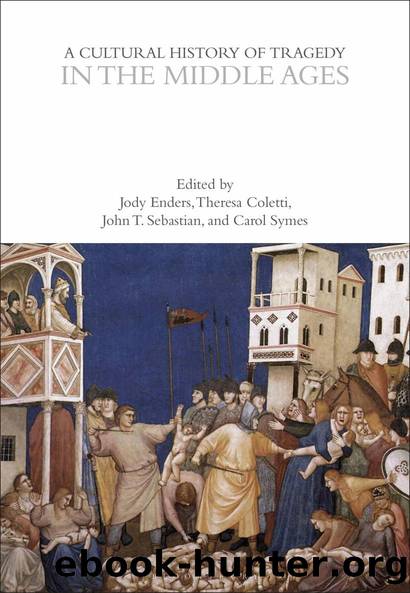A Cultural History of Tragedy in the Middle Ages by unknow

Author:unknow
Language: eng
Format: epub
Tags: Nonfiction, Entertainment, Performing Arts, Theatre, History & Criticism, History
ISBN: 9781350154940
Publisher: Bloomsbury Publishing
Published: 2021-05-20T04:00:00+00:00
MIXED MESSAGES
Although the prospects for conceptualizing the tragic dimensions of medieval biblical drama have received little attention overall, the tragic potentialities of the Massacre of the Innocents as both an episode in scriptural history and a popular subject for medieval performance have not gone unnoticed. Alluding to the mingling of comedy and tragedy in the Chester Massacre, Katharine Goodland identifies the dramatic agency of maternal mourning as the voice âthat bestows tragic significance upon the biblical story.â22 So too, Jane Tolmie speaks to the ways in which âcomic strands ⦠mitigate horrific violenceâ in the Chester playâs unruly juxtaposition of comedy and tragedy.23 In calling out the comic moments that punctuate these spectacles of horror, though, such critical assessments speak to the difficulty of ascribing purely tragic valences to this dramatic corpus, whether those of plot (human infants are gratuitously murdered by a brutal tyrant) or affect (mothers mourn for their lost children and themselves). Tolmieâs characterization of the aesthetic and formal challenges of the Massacre plays is apt: âHigh and low, serious and unserious, sacred and secular, painful and pleasurableâthese plays on the darkest of subjects shift modes with a speed that can seem dizzying to the modern reader.â24
Across verbal, visual, and performative media, the robust medieval traditions of representing Herod further complicate the effort to ascribe tragic modalities to the Middle English Massacre plays. Within the corpus of Middle English Innocents plays, David Staines posits two traditions for representing these playsâ central and enduringly memorable character, Herod: the comic braggart and the tragic hero.25 Addressing these contradictions, Robert Weimann was perhaps the first interpreter of medieval biblical performance to examine the Herod figure as a dense symbolic site as well as a dramatic character. Weimann linked Herodâs role to festive customs of status inversion and mock ceremonial that, from the eleventh century at least, characterized European observances of the Feast of the Innocents during the Christmas season. In such celebrations, lower clergy and choristers in monastic and cathedral churches created Herod as a lord of misrule.26 When these festive Herods migrate to the liturgical performances of Christmastide, they retain the transgressive character that was âever lurking on the outskirts of the liturgy of the twelve days of the ⦠season.â A famous Epiphany play from Padua, Representatio Herodis in nocte Epyphanie, depicts Herod punctuating the ceremonyâs liturgical singing by throwing his wooden staff at the chorus while his ministers, cum magno furore, beat fellow celebrants with inflated bladders.27
For Weimann, these festive customs constitute the âgenetic backgroundâ of medieval English dramaâs exaggerated, bombastic Herod figure, an epitome of feudal tyranny who endowed Christmastide rites of inversion and misrule with social meanings and political commentary.28 Weimannâs most influential contribution to reading medieval English dramatic Herods was to emphasize the figureâs self-conscious, deliberate performance of his role, whose popularity is attested by medieval and early modern memories of the character inscribed in Chaucerâs Millerâs Tale, Shakespeareâs Hamlet, and the fifteenth-century Paston Letters.29 The profound theatricality of these Middle English Herods has likewise inspired important commentary on the verbal and visual signs that constitute it.
Download
This site does not store any files on its server. We only index and link to content provided by other sites. Please contact the content providers to delete copyright contents if any and email us, we'll remove relevant links or contents immediately.
The Universe of Us by Lang Leav(15068)
The Sun and Her Flowers by Rupi Kaur(14509)
Adultolescence by Gabbie Hanna(8918)
Whiskey Words & a Shovel II by r.h. Sin(8009)
Love Her Wild by Atticus(7749)
Smoke & Mirrors by Michael Faudet(6183)
Wiseguy by Nicholas Pileggi(5769)
The Princess Saves Herself in This One by Amanda Lovelace(4969)
Love & Misadventure by Lang Leav(4842)
Memories by Lang Leav(4795)
Milk and Honey by Rupi Kaur(4742)
Bluets by Maggie Nelson(4547)
Too Much and Not the Mood by Durga Chew-Bose(4337)
Pillow Thoughts by Courtney Peppernell(4271)
Good morning to Goodnight by Eleni Kaur(4231)
The Poetry of Pablo Neruda by Pablo Neruda(4097)
Algedonic by r.h. Sin(4056)
HER II by Pierre Alex Jeanty(3605)
Stuff I've Been Feeling Lately by Alicia Cook(3448)
